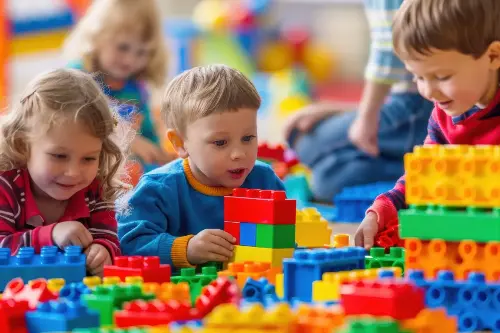Play is often seen as a natural and vital part of childhood, a means by which children explore the world, learn social skills, and let their imaginations run wild. Yet, beneath the innocent joy of playtime lies a highly formative process that helps children develop surprising skills which are crucial for their growth and development. From fostering cognitive abilities to nurturing emotional resilience, the way children play has far-reaching implications, equipping them with tools to navigate life's challenges.

Unveiling cognitive perks through play
One of the most profound benefits that playful activities offer is the enhancement of cognitive skills. Strategically-selected games can sharpen a child’s intellect and improve their problem-solving abilities. For instance, puzzle games not only offer hours of fun but also bolster spatial awareness and logical thinking. Children navigating their way through mazes or constructing shapes with building blocks are not merely engaging with simple toys; they are laying the foundation for mathematical and engineering skills.
Moreover, memory games which prompt kids to recall the location of matching cards, or storytelling activities that encourage them to remember and narrate a sequence of events, fortify working memory and concentration. Such capabilities are not only academic assets but life skills that will serve them well into adulthood, solidifying the idea that play can be as educational as it is entertaining.
Enhancing language and communication skills
The realm of pretend play serves as a fertile ground for language acquisition and the honing of communication skills. As children role-play as astronauts embarking on a space mission, or doctors tending to their patients, they are compelled to articulate thoughts, absorb new vocabulary, and negotiate roles and scenarios with their peers. This expressive form of play not only broadens their linguistic repertoires but also teaches them to listen and respond appropriately: a cornerstone of effective communication.
In addition, group games and activities demand the adherence to rules and the ability to convey complex concepts succinctly, which in turn refines their verbal abilities and helps them become more proficient communicators.
Nurturing social and emotional intelligence
Children's playground interactions are more than just a way to burn off excess energy; they're a classroom for emotional education. Through turn-taking games and teamwork exercises, children learn the importance of patience, cooperation, and empathy. As they navigate the intricacies of shared play, children also develop conflict resolution strategies and understand the significance of fairness and justice.
Moreover, unstructured play offers children the freedom to express themselves and manage emotions such as frustration and elation, in a controlled environment. By making sense of their feelings through play, children build emotional intelligence – a quality that is vital for personal relationships and professional success in later life.

Cultivating creativity and agility
Creative play is a gateway to ingenuity and agility. As children explore scenarios where they have to build a fort with limited resources or devise a performance with an impromptu script, they are engaging in a kind of cognitive gymnastics. This type of play encourages lateral thinking, a necessary skill that allows for adaptability in a rapidly changing world. By generating unique solutions and embracing unconventional ideas, children foster a level of creativity that transcends artistic pursuits and infiltrates every aspect of problem-solving in life.
Moreover, activities such as obstacle courses or interactive video games that demand quick reflexes also fine-tune motor skills and physical agility. A child's ability to assess a situation and react swiftly is a physical counterpart to mental agility, vital for emerging sports stars and little adventurers alike.
Incorporating intentional playful learning at home
Recognising the developmental power of play, parents and guardians can incorporate intentionally structured playtime into their children’s routines. This does not necessitate an overhaul of their toy box, but rather a mindful approach to engaging with the playthings they already possess. Simple alterations, like asking open-ended questions during a board game, or challenging children to build the tallest structure they can with blocks, infuses an extra layer of skill development into play.
Moreover, technology need not be the enemy of play; educational apps and interactive games can be exceptional tools for learning when used judiciously. Selecting apps that promote problem-solving, literacy, or numeracy, paves the way for a harmonious relationship where screen time equates to learning time.
The seemingly insignificant moments of childhood playtime are the building blocks for a suite of skills that shape a child's future. From boosting cognitive capabilities to refining social interactions, the impact of playful activities is both broad and deep. By acknowledging and fostering the educational benefits of play, we provide children with the fun, engaging experiences they love whilst setting the stage for lifelong learning and adaptation. Thus, while playtime may be temporary, the skills it develops are permanent, echoing well beyond the ephemeral joys of childhood.
